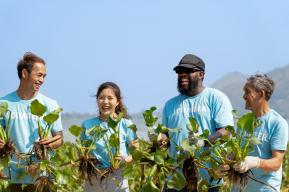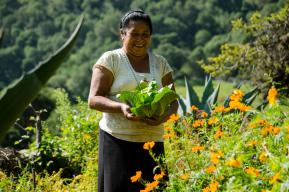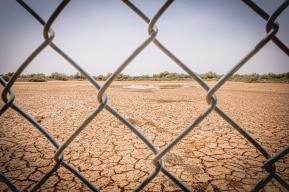The speakers highlighted the plurality of inequalities, proposed ways to concretely design policies with inclusion and sustainability at the center, and called for the need of strengthened cohesion in our societies and trust in our institutions. Joined by 280 in-person participants and over 4500 online viewers on 18 April 2023 at UNESCO Headquarters, the Forum emphasized the importance of mobilizing interdisciplinary and multiscale knowledge from social and human sciences, to untangle the multi-dimensional, multi-layered, and cumulative nature of inequalities.
Dr Mary Khimulu, President of the MOST Intergovernmental Council, and Gabriela Ramos, UNESCO Assistant Director-General for Social and Human Sciences, opened the Forum and emphasized the need for a people-centered and knowledge-driven policies to reset towards equitable and sustainable outcomes.
The multiple crises society faces today are not exogenous, they are the result of our policy decisions. They are men-made. The good news is that this can change, we can look for better ways to organize our societies and economies, and to place people at the center of the design of our policy frameworks.
Complementarily, Peter Gluckman, President of the International Science Council, stressed the importance of social cohesion enabling people to cooperate for collective good, and that science and long-term thinking for policy-making is foundational to collaborative and inclusive outcomes. He highlighted that: “scholarly and policy discourses need to come together. The promotion of transdisciplinary thinking between different domains is critical to making progress.”

Mariana Mazzucato, Founding Director of University College London’s Institute for Innovation and Public Purpose pointed out the “need [for] a common-good approach to shape markets with a purposeful direction. If we design an economy driven by the four principles of collaborative and collective learning, reward sharing with equitable access, transparency, and accountability - we can stop reacting to crisis after crisis.”
Panellists from the Forum highlighted the multidimensional nature of inequalities and proposed insightful solutions to tackle them in context: from gendered, moral, ecological, migration, and geographical perspectives. In particular, solidarity was raised as an important element in building collective responses, but also as a dimension of inequality.
In crises, women and girls are often on the wrong side of inequality. Phumzile Mlambo-Ngcuka, the former Executive Director of UN Women, reflected on the resilience of patriarchy and the need for significant policies to support gender equality. She emphasized engaging men as an important constituency in the feminist movement, calling on them to use their power and influence to bring about positive change: “We do not want to praise fish for swimming. Men should care about gender equality and understand the impact of its policies because it is the right thing to do. It is their responsibility.”
Kako Nubukpo, Commissioner of Togo at the West African Economic and Monetary Union (UEMOA) noted that Africa is the most unequal continent globally, exacerbated by climate change driven urban migration. He shared that solidarity is at the center of African life, and urged individuals, institutions, and governments to re-found this solidarity based on the need to protect its ecological commons, and proposed the creation of a fund that recognizes the opportunity costs of Africa’s ecological services to the international community.
Responding to ADG/SHS Gabriela Ramos’ proposition to "measure what we treasure, not treasure what we measure", Dennis Snower, President of the Global Solutions Initiative advised to treasure living with moral values, as moral failures inhibit collective action necessary for addressing inequalities. He proposes to measure solidarity, agency, material gain and environmental sustainability (SAGE) in accordance with three principles of universality, comparability and regularity. “Inequality must be considered not only in terms of income and wealth, but also in terms of solidarity and agency.”

Additionally, building solidarity and collective action relies on multidisciplinary and place-based knowledge. Fabrizio Barca, Former Minister for Territorial Cohesion of Italy, advocated for moving beyond the concentration of knowledge and decision-making in the hands of a few. He called for open science, creation of public infrastructure for research and development, community-ownership of data and data altruism, and the translation of granular place-based knowledge into policies attuned to real needs. “The impact on places and communities needs to be the object of public debate.” Likewise, Mathias Vicherat, President of SciencesPo Paris, highlighted the importance of adopting multidisciplinary approaches to tackle complex issues like climate change. By integrating social and human sciences with fundamental sciences, we can diversify our solutions.
These discerning takeaways from the High-Level Panel of the Forum was followed by the Think Tanks Roundtable and concluded with the BRIDGES Coalition on Sustainability Science, each calling to change course of our current trends, considering different policy choices, and to engage in a wider set of actors in an inclusive manner. The first of many, this MOST Forum marked the beginning of renewed thought leadership integrating novel concepts into our analysis of the transformations of contemporary societies, diversifying and enhancing our policy responses.









